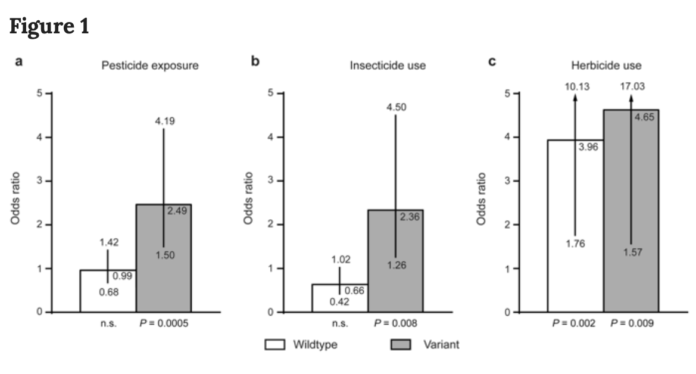Pesticide exposure is associated with increased risk of Parkinson’s disease (PD). We investigated in Egypt whether common variants in genes involved in pesticide detoxification or transport might modify the risk of PD evoked by pesticide exposure. We recruited 416 PD patients and 445 controls. Information on environmental factors was collected by questionnaire-based structured interviews. Candidate single-nucleotide polymorphisms (SNPs) in 15 pesticide-related genes were genotyped. We analyzed the influence of environmental factors and SNPs as well as the interaction of pesticide exposure and SNPs on the risk of PD. The risk of PD was reduced by coffee consumption [OR = 0.63, 95% CI: 0.43–0.90, P = 0.013] and increased by pesticide exposure [OR = 7.09, 95% CI: 1.12–44.01, P = 0.036]. The SNP rs1126680 in the butyrylcholinesterase gene BCHE reduced the risk of PD irrespective of pesticide exposure [OR = 0.38, 95% CI: 0.20–0.70, P = 0.002]. The SNP rs1803274, defining K-variant BCHE, interacted significantly with pesticide exposure (P = 0.007) and increased the risk of PD only in pesticide-exposed individuals [OR = 2.49, 95% CI: 1.50–4.19, P = 0.0005]. The K-variant BCHE reduces serum activity of butyrylcholinesterase, a known bioscavenger for pesticides. Individuals with K-variant BCHE appear to have an increased risk for PD when exposed to pesticides.
Rösler TW, Salama M, Shalash A, Khedr E,Abdelhalim El-Tantawy, Gharib Fawi, Amal El-Motayam, Ehab El-Seidy, Mohamed El-Sherif, Mohamed El-Gamal, Mohamed Moharram, Mohammad El-Kattan, Muhammad Abdel-Naby, Samia Ashour, Ulrich Müller, Astrid Dempfle, Gregor Kuhlenbäumer and. Höglinger GU. 2018. K-variant BCHE and pesticide exposure. Genetic-environment interactions in a case-control study of Parkinson’s Disease in Egypt.
معهد الصحة العالمية والبيئة البشرية، الجامعة الأمريكية بالقاهرة، مصر
أنشأ الدكتور محمد سلامة أول وحدة لعلم الأعصاب الترجمي في مصر. أدت أبحاث محمد التعاونية إلى إنشاء الشبكة المصرية للاضطرابات العصبية التنكسية (إند). تم اختيار محمد كباحث أول في SOT Global في عام 2013 وحاصل على جائزة الترجمة/التجسير في عام 2016. وقد حصل على جائزة من مؤسسة باركنسون واضطرابات الحركة (PMDF) لأبحاثه المستمرة في مجال التنكس العصبي.
ومؤخراً، نجح محمد وزملاؤه في صياغة النسخة الأولى مرجع الجينوم المصري والتعاون مع زملاء آخرين لبدء مجموعة وطنية (دراسة طولية للشيخوخة الصحية المصرية [الصحة]). حاليًا، يشغل محمد منصب زميل أول في أتلانتيك للمساواة في صحة الدماغ في المعهد العالمي لصحة الدماغ (GBHI) وأستاذ مشارك في معهد الصحة العالمية والبيئة البشرية في الجامعة الأمريكية بالقاهرة (AUC).



